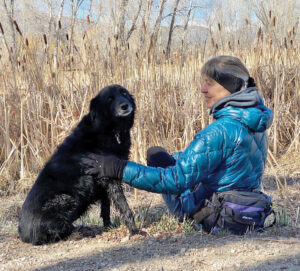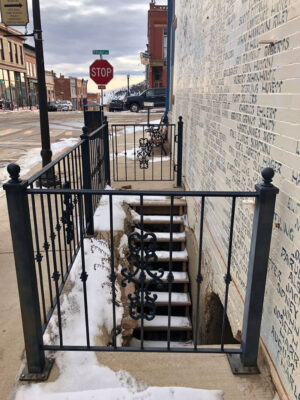By Susan Tweit
When social-distancing and shelter-in-place became “things” in response to the COVID-19 pandemic, I figured I was prepared. As a friend said, “At last, a skill-set I can use!” I’m an introvert and a writer: alone-time is a necessity for me. And I’ve been a widow for nearly a decade, so I’m quite used to my own company.
I’m also a natural distancer; I live in a body studded with what feels like thousands of tiny antennae tuned to sensory information. It’s easy to be overwhelmed by humanity’s din: the tone of our voices, the noise of our digital devices, our volatile emotions and the electricity of our metabolic energy.
Normally, I dispel that onslaught of non-verbal information by limiting my social contact, spending hours writing and reading or by solo physical activity: hiking, digging in my garden or renovating my house. And also—and this may seem counter-intuitive, but it is critical—through physical touch with friends and family. Unlike the rest of the sensory stimuli that come my way, that familiar and familial tactile connection is both comforting and soothing.
Research supports the quieting and calming effect of gentle touch on our emotions, metabolisms and our overall health—body, mind and spirit. Touch is a literal balm, and also a bond. When I am frazzled and struggling to keep my emotional and mental balance, the warmth of a friend’s hand, a hug or even the press of a dog’s muzzle on my leg help me settle.
That need for regular touch is part of why I decided last summer it was time to alter my determinedly solo state and open my life to a dog again. I was driving to Wyoming to teach a seminar at a spiritual retreat center when I asked the universe for a dog, and promised I’d take the next one that came along. The very next day, up wandered a gentlemanly, white-muzzled bird-dog—who came with a guy and The Guy’s four horses. Apparently the universe has quite a sense of humor, because I really did just want a dog ….
Over the next few months, my life filled with bodily contact: snuggling with the dog, being nuzzled by the horses and sleeping skin-to-skin with The Guy. It was the bounty of loving company I needed, even if I hadn’t known. Then the COVID-19 crisis brought social-distancing and shelter-in-place. Within a week of my state shutting down, my new herd, two- and four-legged, headed for The Guy’s farm, 400 miles away. It was spring, and farm-chores couldn’t wait: the hayfields needed prepping, irrigation pipes had to be laid out, ditches wanted cleaning and the tractor and implements needed tuning up.
As the big truck and the horse trailer pulled away, I realized I was alone in a way I had never been, despite living solo for years. With social-distancing and no household members in residence, I could no longer touch or be touched. There would be no hugging friends, holding hands with my nieces, getting a massage or even fist-bumping the guys who fixed my flat tire.
By the time it was safe to rejoin my herd a month later, I was starved for physical contact. I felt ungrounded and unstable, more lonely than I had ever imagined. It’s not surprising: humans are, after all, a herd species. No matter how solitary we may think ourselves, we need touch; without it, we become alienated from our own humanness. That alienation is why babies who are not held develop attachment disorders, and prisoners in solitary confinement often succumb to mental illness. Without physical contact, the skin-to-skin bond that tethers us to our own species, and thus to life itself, is severed.
After the prolonged social isolation of COVID-19, perhaps it’s no coincidence that we are finally confronting racism and the horrifying brutality that goes with it. What we thought was normal has been entirely upended. Could this be our opportunity to re-imagine what is possible and build a society that “matches our scenery,” as Wallace Stegner wrote? A society able to offer everyone—regardless of skin color, gender, sexual orientation, religious beliefs—equal justice, education, and equal opportunities to liberty and the pursuit of happiness?
To rise to that ideal, we need to act from the best of our shared humanity. That includes reconnecting through the simple but profound gesture of physical touch—when that’s appropriate—and once it’s safe to reach for each other again.
Susan J. Tweit is a writer and part-time hay farmer; her idea of a fashion statement is wearing a black skort with her irrigation boots.
The Last Word is sponsored by Judith and Ed Kinzie.


